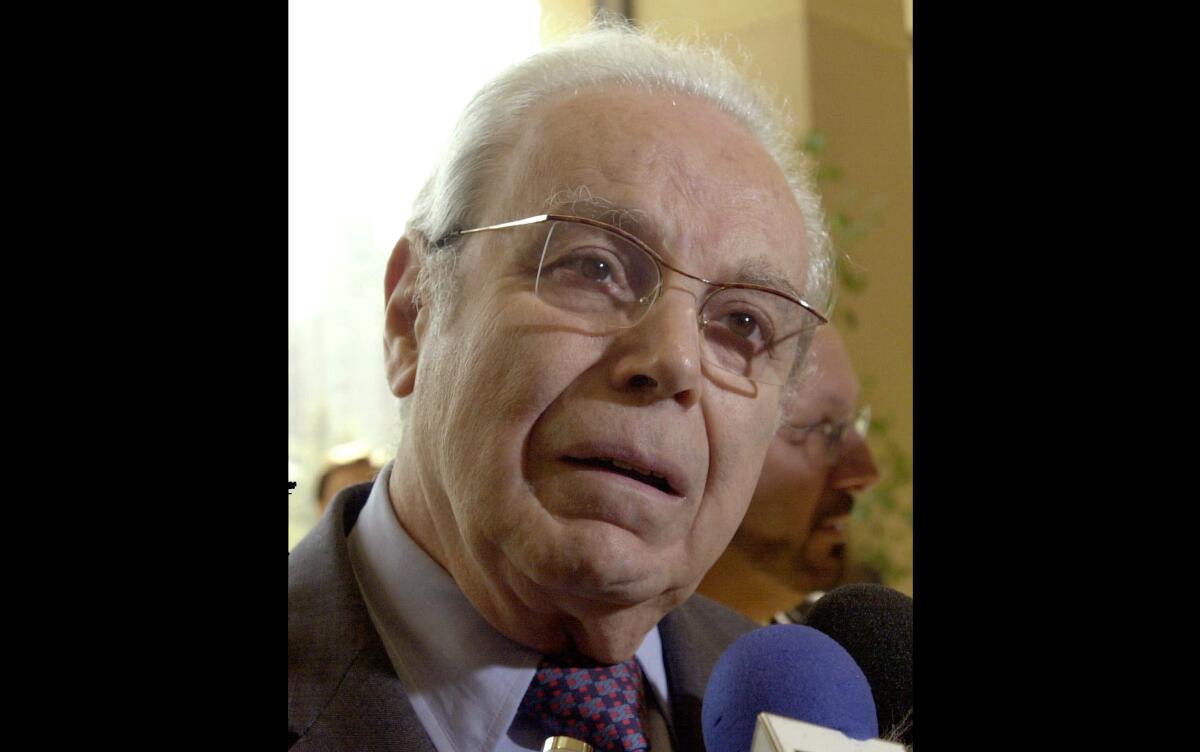Javier Pérez de Cuéllar, Peruvian two-term United Nations chief, dies at 100

- Share via
LIMA, Peru — Javier Pérez de Cuéllar, the two-term United Nations secretary-general who brokered a historic cease-fire between Iran and Iraq in 1988 and who in later life came out of retirement to help reestablish democracy in his Peruvian homeland, died Wednesday, Peru’s foreign ministry said. He was 100.
His son, Francisco Pérez de Cuéllar, said his father died at home of natural causes. The former diplomat was “an outstanding Peruvian, a full-bodied democrat, who dedicated his life and work to making our country great,” tweeted Peruvian President Martín Vizcarra late Wednesday.
Pérez de Cuéllar’s death ends a long diplomatic career that brought him full circle from his first posting as secretary at the Peruvian embassy in Paris in 1944 to his later job as Peru’s ambassador to France.
When he began his tenure as U.N. secretary-general on Jan. 1, 1982, he was a little-known Peruvian who was a compromise candidate at a time when the United Nations was held in low esteem.
Serving as U.N. undersecretary-general for special political affairs, he emerged as the dark horse candidate in December 1981 after a six-week election deadlock between U.N. chief Kurt Waldheim and Tanzanian Foreign Minister Salim Ahmed Salim.
Once elected, he quickly made his mark.
Disturbed by the United Nations’ dwindling effectiveness, he sought to revitalize the world body’s faulty peacekeeping machinery.
His first step was to “shake the house” with a highly critical report in which he warned: “We are perilously near to a new international anarchy.”
With the 1982 Israeli invasion of Lebanon, and with conflicts raging in Afghanistan and Cambodia and between Iran and Iraq, he complained to the General Assembly that U.N. resolutions “are increasingly defied or ignored by those that feel themselves strong enough to do so.”
“The problem with the United Nations is that either it’s not used or misused by member countries,” he said in an interview at the end of his first year as U.N. secretary general.
During his decade as U.N. chief, Pérez de Cuéllar would earn a reputation more for diligent, quiet diplomacy than charisma.
Faced early in his first term with a threatened U.S. cutoff of funds in the event of Israel’s ouster, he worked behind the scenes to stop Arab efforts to deprive the Jewish state of its General Assembly seat. There was muted criticism from the Arab camp that he had given the Americans the right of way in the Middle East.
In dealing with human rights issues, he chose the path of “discreet diplomacy.” He refrained from publicly rebuking Poland for refusing to allow his special representative into the country to investigate allegations of human rights violations during the Warsaw regime’s 1982 crackdown on the Solidarity trade union movement.
Pérez de Cuéllar spent much of his second term working behind the scenes on the release of Western hostages held in Lebanon, including the last and longest-held American hostage, journalist Terry Anderson, who was freed on Dec. 4, 1991.
All tolled, Pérez de Cuéllar’s diplomacy helped bring an end to fighting in Cambodia and the 1980-88 Iran-Iraq war, and the withdrawal of Soviet troops from Afghanistan.
Shortly after midnight on Jan. 1, 1992, he walked out of U.N. headquarters to his waiting limousine, no longer the secretary-general, but having attained his final goal after hours of tough negotiations: a peace pact between the Salvadoran government and leftist rebels.
Pérez de Cuéllar married the former Marcela Temple. He had a son, Francisco, and a daughter, Cristina, by a previous marriage.
His funeral will be held at Peru’s foreign ministry on Friday.
More to Read
Sign up for Essential California
The most important California stories and recommendations in your inbox every morning.
You may occasionally receive promotional content from the Los Angeles Times.










